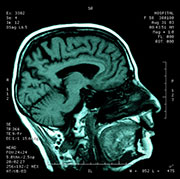- Double Mastectomy May Offer No Survival Benefit to Women With Breast Cancer
- Toxic Lead Found in Cinnamon Product, FDA Says
- Certain Abbott Blood Sugar Monitors May Give Incorrect Readings
- Athletes Can Expect High Ozone, Pollen Counts for Paris Olympics
- Fake Oxycontin Pills Widespread and Potentially Deadly: Report
- Shingles Vaccine Could Lower Dementia Risk
- Your Odds for Accidental Gun Death Rise Greatly in Certain States
- Kids From Poorer Families Less Likely to Survive Cancer
- Tough Workouts Won’t Trigger Cardiac Arrest in Folks With Long QT Syndrome
- At-Home Colon Cancer Test Can Save Lives
Study Probes Heroin Addiction’s Effect on the Brain


MONDAY, Nov. 11Long-term heroin use changes how genes are activated in the brain, which leads to changes in brain function, according to a new study.
Researchers examined the brains of dead heroin users and focused on an area of the brain called the striatum, which plays a key role in drug abuse. They found significant changes in how DNA was being used in the brains, and the degree of change matched the number of years of heroin addiction.
They also found evidence that heroin overdose causes brain changes other than addiction, which indicates that the behaviors that lead to overdose have a different neural basis than those that lead to long-term abuse.
The observed changes to brain function are driven by a process called epigenetics. This means environmental events modify the shape and packaging of DNA without changing the underlying DNA itself.
Instead, the structure of the DNA becomes more “open” or “closed,” allowing some genes to be expressed [activated] more or less often. This changes what proteins are produced and, as a result, can change how the brain functions, the researchers said.
The study was scheduled for presentation Sunday at the annual meeting of the Society for Neuroscience in San Diego.
“Our study addresses a critical gap in our knowledge about heroin addiction because we cannot often directly study the brains of addicted humans,” senior author Yasmin Hurd, of the Icahn School of Medicine at Mount Sinai, in New York City, said in a society news release.
“Our results provide important insights into how human brains change in response to long-term heroin use, and give us the knowledge to help treat this dangerous disease,” Hurd said.
According to the World Health Organization, 9.5 million people worldwide abuse heroin, which puts them at a 20 to 30 times higher risk of death than non-drug users.
Data and conclusions presented at meetings typically are considered preliminary until published in a peer-reviewed medical journal.
More information
The U.S. National Institute on Drug Abuse has more about heroin.
Source: HealthDay
Copyright © 2024 HealthDay. All rights reserved.










